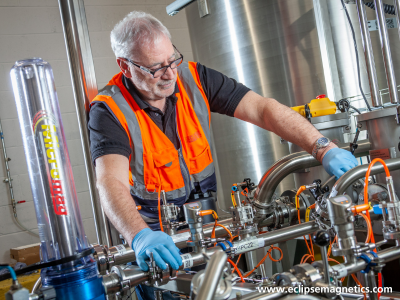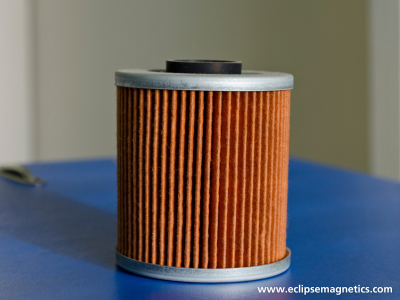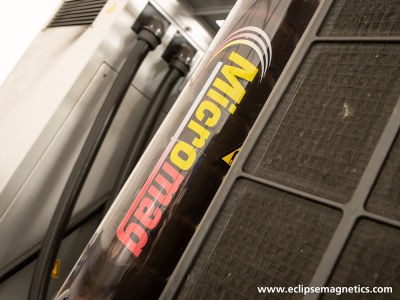Micromag Magnetic Filter
Compact, high-performance grinding coolant filtration systems (flow rates up to 150 litres per min.)
Hello...
Would you like to visit the Eclipse Magnetics US site to view all relevant content for your location?
In the intricate world of CNC machining, the significance of effective filtration cannot be overstated. Filtration systems play a crucial role in maintaining the health and efficiency of CNC machines by removing contaminants from cutting fluids, oils and lubricants.
This article delves into various types of filtration methods employed in CNC machines, providing insights into the workings of paper filters, cartridge filters, bag filters, and magnetic filters.
 CNC machines are widely used in precision manufacturing, where accuracy and consistency are paramount. These machines operate with cutting fluids and lubricants to enhance tool life, improve surface finish, and dissipate heat generated during machining processes. However, these fluids are susceptible to contamination from various sources, including metal shavings, dirt, and other particles produced during operation.
CNC machines are widely used in precision manufacturing, where accuracy and consistency are paramount. These machines operate with cutting fluids and lubricants to enhance tool life, improve surface finish, and dissipate heat generated during machining processes. However, these fluids are susceptible to contamination from various sources, including metal shavings, dirt, and other particles produced during operation.
Without effective filtration, these contaminants can compromise the quality of the machining process, leading to increased tool wear, degraded surface finishes, and potential damage to machine components. Additionally, the accumulation of contaminants can adversely affect the overall efficiency and lifespan of the CNC machine.
To combat these challenges, various filtration methods are employed to remove unwanted particles from the cutting fluids and lubricants used in CNC machines. Each filtration type has its unique way of working, as well as its own set of advantages and disadvantages.
In this article, we will explore the intricacies of paper filters, cartridge filters, bag filters, and magnetic filters, shedding light on how each method contributes to maintaining a clean and efficient CNC machining environment, as well as discussing the pros and cons of each method.
Paper filters are one of the most common types of filtration systems used in CNC machines. They typically consist of a roll or sheets of paper-like material through which the cutting fluids pass. The paper material is designed to capture and retain contaminants, preventing them from circulating back into the machining process.
In operation, the cutting fluids laden with contaminants flow through the paper filter. As the fluids pass through the porous paper, particles such as metal shavings and debris are trapped on the filter's surface. The clarified fluid then continues its circulation within the CNC machine, promoting a cleaner and more efficient machining process.
Compared to some other filtration methods, paper filters are often more economical, making them an attractive choice for certain applications.
Paper filters are widely available, making them easy to obtain. This means that you have a wide range of choice when it comes to manufacturers and types of paper filter.
Paper filters can have a relatively short lifespan, especially in high-volume machining environments, requiring frequent replacements.
In intensive machining operations, paper filters may clog faster, necessitating more frequent monitoring and replacement. They may also tear under heavy use, allowing contamination to flow through the filter medium.
Paper filters contribute to environmental waste due to their disposable nature. The constant need for replacement adds to the accumulation of discarded filter materials, raising sustainability concerns. There is a risk of excessive landfill from using these filters.
While paper filters are generally easy to replace, the frequent need for maintenance and replacements can lead to downtime in CNC operations. This can impact productivity and increase operational costs associated with labour and machine idleness.
Despite their efficiency in capturing fine particles, some paper filters may allow smaller particles to pass through, compromising the overall filtration effectiveness. This can result in the continued presence of contaminants in the cutting fluids.
 Cartridge filters are another prevalent filtration method in CNC machining. These filters employ cylindrical cartridges made of various materials, including paper, fabric, or metal, to capture and retain contaminants present in cutting fluids.
Cartridge filters are another prevalent filtration method in CNC machining. These filters employ cylindrical cartridges made of various materials, including paper, fabric, or metal, to capture and retain contaminants present in cutting fluids.
The operation of cartridge filters involves the flow of contaminated cutting fluids through the cylindrical cartridges. As the fluid passes through the filter media, contaminants are trapped, and the clarified fluid proceeds through the CNC machine.
Cartridge filters are known for their extended lifespan when compared to paper filters, making them suitable for applications with moderate to heavy machining demands.
Cartridge filters typically have a longer lifespan than paper filters, reducing the frequency of replacements and associated downtime.
The design and materials of cartridge filters often result in improved filtration efficiency, capturing a broader range of particle sizes.
Cartridge filters offer versatility in filter media options, allowing users to choose materials based on specific machining needs. This adaptability enhances their effectiveness in capturing a diverse range of contaminants.
Cartridge filters may have a higher initial cost compared to paper filters, requiring a larger upfront investment.
While cartridge filters last longer, they may require more intricate maintenance procedures, such as periodic cleaning or replacement of filter elements, which could increase operational complexity.
Depending on the design and size of the CNC machine, the use of cartridge filters may lead to increased energy consumption. This is especially relevant if the machine's pump must work harder to circulate fluids through the denser filter media.
While cartridge filters offer adaptability, changing filter media types can be more complex than replacing entire paper filters. This complexity may require additional training or expertise, impacting maintenance procedures.
Cartridge filters, like their paper counterparts, contribute to environmental concerns due to the disposal of used filter elements. There is a risk of excessive landfill from using these filters. The materials used in some cartridges may be non-biodegradable, adding to the overall environmental footprint. Proper disposal methods or recycling options must be considered to mitigate these sustainability challenges.
Bag filters, a distinctive filtration method, utilise a bag-shaped filter medium to capture and retain contaminants from cutting fluids in CNC machines. These filters are designed to accommodate a wide range of particle sizes and are commonly employed in various machining applications.
The functionality of bag filters involves the flow of contaminated cutting fluids through the bag-shaped filter. The bag captures particles, preventing them from re-entering the machining process. Bag filters are known for their high dirt-holding capacity and are suitable for applications where larger volumes of contaminants are expected.
Bag filters excel in holding a large volume of contaminants, reducing the frequency of replacements and minimising downtime.
In scenarios with significant contamination levels, the cost-effectiveness of bag filters becomes evident as they can handle larger quantities of debris without rapid clogging.
While effective for larger particles, bag filters may not provide the same level of filtration for fine particles as some other methods. This limitation could impact the overall cleanliness of the cutting fluids.
The bag filter material is susceptible to tearing or damage, especially in high-stress machining environments. This vulnerability may result in the release of contaminants and compromise the filtration process.
Like paper and cartridge filters, the disposal of used bag filters raises environmental concerns. The non-biodegradable nature of some filter materials contributes to the accumulation of waste, necessitating proper disposal practices for sustainability.
 Magnetic filters provide a unique approach to CNC machine filtration by leveraging magnetic fields to capture ferrous particles from cutting fluids. These filters are designed to attract and retain metal contaminants, enhancing the cleanliness of the fluid used in machining processes.
Magnetic filters provide a unique approach to CNC machine filtration by leveraging magnetic fields to capture ferrous particles from cutting fluids. These filters are designed to attract and retain metal contaminants, enhancing the cleanliness of the fluid used in machining processes.
Magnetic filters function through the application of magnetic fields within the CNC machine. As the cutting fluid passes through the magnetic filter, ferrous particles are magnetically attracted and held onto the filter's surface. This process effectively removes metal contaminants, preventing their circulation back into the machining process.
By capturing ferrous contamination and holding it with magnetic force, some of the non-magnetic contamination may also be trapped amongst the collected ferrous contamination to provide a degree of extra capture (depending on the application).
It is always recommended to place a magnetic filter before any other filter type. This allows the magnet to capture as much as possible, so the other filter has less to capture prolonging its life significantly.
Magnetic filters are capable of removing ferrous particles at a sub-micron level. This is superior to all barrier methods of filtration, ensuring the removal of metal contaminants that could otherwise compromise the CNC machining process.
Magnetic filters typically require minimal maintenance compared to other filtration methods. Manual systems require periodic cleaning, whilst automated systems require minimal maintenance (e.g. systems with 24 hour operation with automated cleaning cycles). The magnet filter is not a consumable – just clean and re-use.
Magnetic filters can offer sustainability advantages by promoting a cleaner and more efficient machining process. With reduced reliance on disposable filter media, there is less environmental impact, making magnetic filtration a potentially more sustainable option in the long run.
Contamination collected by a magnetic filter is easily cleaned off to allow for recycling back into the production chain to make new product, rather than being sent to landfill. If you don’t need to replace the other filters, less waste ends up in landfill and less is spent on such consumables. And, with longer intervals between changing the other filters, using automated magnetic filters can reduce maintenance downtime costs.
A cleaner system may also prolong intervals between fluid changes, providing additional environmental and cost benefits. In light of a global need to reduce carbon footprint to help protect our planet, magnetic filters offer means improving material consumption with improved recycling possibilities.
Magnetic filters generally have lower energy consumption compared to some other filtration methods. The absence of power-hungry pumps or complex filter media systems contributes to a more energy-efficient CNC machining setup. A non-automated magnetic filter requires no power to operate.
Magnetic filters are designed with features to prevent blockages. This means that even if the filter reaches its collection capacity, the fluid continues to run through the filter without blocking or causing excessive pressure drops. This helps to reduce the risk of unplanned downtime.
The ferrous contamination that is collected can be more easily sold back to recyclers rather than contamination stuck within other filter media risking being sent to landfill.
With less consumables used, and an extended interval between filter changes, fluid changes and maintenance work, the cost of a magnetic system starts to be offset by those cost savings. In applications with heavier contamination, the return on investment may start to happen more quickly.
While highly effective for ferrous particles, magnetic filters may not capture non-ferrous contaminants (other than that which may have become trapped between the ferrous contaminants). This limitation necessitates supplementary filtration methods for comprehensive contaminant removal.
The initial investment for magnetic filtration systems may be higher than some traditional filter types. However, the long-term benefits and reduced maintenance costs may offset the initial expense over time.
| Paper Filter | Cartridge Filter | Bag Filter | Magnetic Filter |
Initial Investment | Low | Low | Low | Medium - High |
Collection Capacity | Low | Medium | Medium | High |
Collection Material | Ferrous and non-ferrous | Ferrous and non-ferrous | Ferrous and non-ferrous | Ferrous only |
Lifespan | Shorter | Medium | Medium | Long |
Sustainability | Disposable | Disposable | Disposable | Reusable |
In the intricate landscape of CNC machining, the choice of filtration method significantly influences the efficiency, precision, and sustainability of the overall process. Each filtration type brings a unique set of advantages and challenges to the table.
Paper filters, while cost-effective and efficient at capturing fine particles, come with limitations in lifespan and environmental sustainability. Cartridge filters offer extended service life and superior filtration but may pose higher upfront costs and maintenance complexities. Bag filters stand out for their high dirt-holding capacity, yet they may fall short in fine particle filtration and are susceptible to damage.
On the other hand, magnetic filters provide an innovative solution with effective ferrous particle removal, low maintenance requirements, and potential sustainability benefits. While each filtration type has its strengths and weaknesses, the choice ultimately depends on the specific requirements and priorities of the CNC machining operation.
For many applications, a magnetic filter will complement the existing filter systems, enhancing filtration performance, reducing consumable usage, and extending maintenance intervals.
As CNC technology continues to advance, the quest for optimal filtration methods persists. Balancing factors such as filtration efficiency, maintenance needs, initial costs, and sustainability considerations will guide machine operators toward the most suitable filtration solution for their unique machining environment.
By understanding the nuances of each filtration type, CNC professionals can make informed decisions to enhance the performance and longevity of their equipment, while minimising environmental impact.
If your fluids contain ferrous contaminants and you consume a lot of filters annually, by simply adding a magnetic filter before your existing filter systems, you will start to gain benefits including reduced consumable usage, less landfill usage, improving carbon footprint and long-term cost savings. Some of these can be easily measured and tracked for clear return on investment. Now ask yourself, “Why wouldn’t I want to consider a magnet filter in my system?”